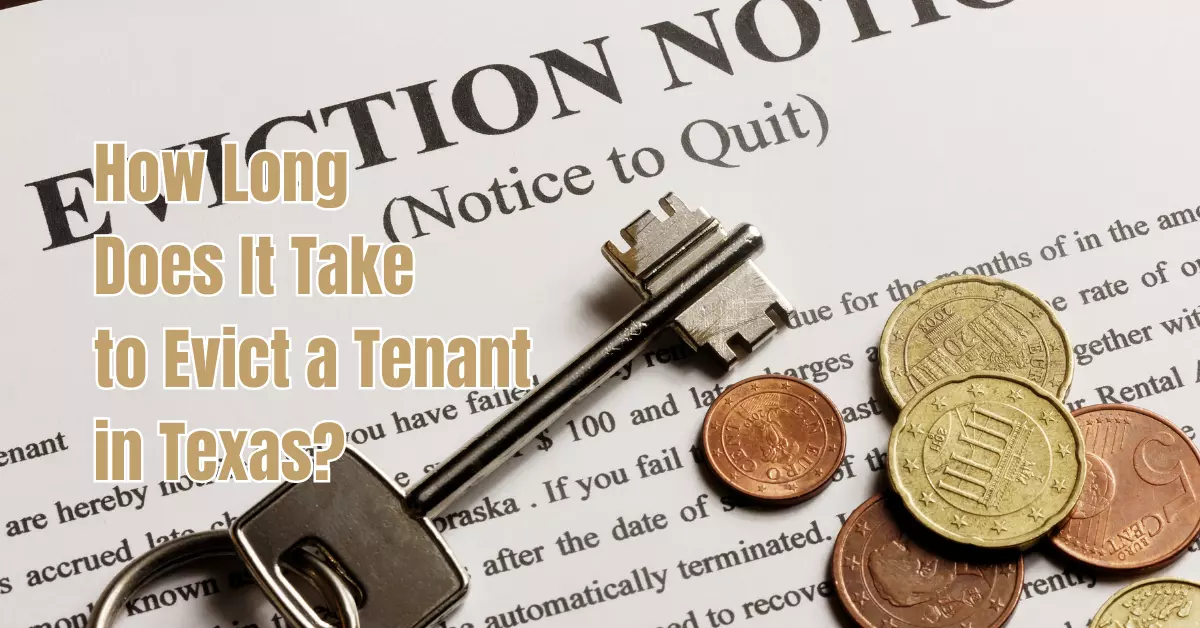In Texas, the timeframe for an eviction to take place can range from 20 to 30 days. Evicting a tenant in Texas can be a tricky process that requires navigating several legal requirements and timelines.
In some cases, landlords may also need to go to court to obtain an official eviction order if the tenant refuses to leave willingly.
It’s important to work with an experienced eviction attorney to ensure that you’re following all the necessary steps and timelines.

Understanding The Texas Eviction Laws
If you’re a landlord in Texas and you’re facing issues with a tenant, you need to be aware of the eviction laws in Texas. Eviction is the process of legally removing a tenant from a rental unit.
The Texas eviction laws cover various aspects of eviction, including notice periods, legal reasons for eviction, rental agreement terms, and more.
Different Types Of Eviction Notices And Their Time-Frame
Before filing an eviction lawsuit, you need to serve an eviction notice to the tenant. In Texas, different types of eviction notices are available, depending on the reason for the eviction.
Here are some common types of eviction notices along with their time frame:
for non-payment of rent
This notice requires the tenant to vacate the premises within three days of receiving the notice.
for violation of lease terms
This notice is served to tenants who violate the terms of their lease agreement. The tenant has to vacate the premises within 30 days of receiving the notice.
for illegal activity
This notice requires the tenant to vacate the premises within three days of receiving the notice.
for holdover tenant
This notice is served to tenants who stay beyond the termination of their lease agreement. The tenant has to vacate the premises within three days of receiving the notice.
Legal Reasons For Eviction
While Texas allows eviction for various reasons, landlords must have a legal reason for eviction, or they could face legal action. Here are some legal reasons for eviction in Texas:
- Non-payment of rent.
- Property damages.
- Noise violations.
- Illegal activities on the premises.
- Lease violations, such as unauthorized pets or subletting.
- Holdover tenancies.
Rental Agreement And Lease Termination Terms
Rental agreements and lease termination terms are essential aspects of the eviction process.
It’s important to understand the terms of the rental agreement before serving an eviction notice.
Here are some crucial points related to rental agreements and lease termination terms in Texas:
- Month-to-month tenancy agreements require a 30-day notice before terminating the lease.
- Texas law does not require written rental agreements, but having one can avoid disputes between the landlord and the tenant.
- If a tenant breaches the rental agreement, the landlord can terminate the lease by providing a written notice as per Texas law.
Filing The Eviction Lawsuit
Evicting a tenant in Texas is a legal process that requires following specific steps and timelines. Failure to follow the correct procedure can lead to delays and legal consequences for the landlord.
Let’s explore the process and timelines involved in filing an eviction lawsuit in Texas.

Timelines Involved In The Lawsuit Filing Process
When filing an eviction lawsuit in Texas, landlords must follow a specific timeline to ensure that the process is completed in a timely manner.
The timelines involved in the lawsuit filing process are as follows:
Notice to vacate
If the tenant fails to pay the rent or violates the lease agreement, the landlord must serve a notice to vacate. The notice should give the tenant at least three days to vacate the rental property.
Lawsuit filing
If the tenant fails to vacate the rental property after receiving the notice to vacate, the landlord can file an eviction lawsuit.
The lawsuit should be filed in the justice of the peace court in the county where the rental property is located.
Summons and hearing
After filing the lawsuit, the court will issue a summons to the tenant, informing them of the lawsuit and the date of the hearing. The hearing is typically scheduled within two weeks of the lawsuit filing date.
Appeal period
If the tenant is evicted, they have five days to appeal the decision in writing.
Necessary Forms And Documents
To file an eviction lawsuit in Texas, landlords must fill out specific forms and provide specific documents. The necessary forms and documents are:
- Notice to vacate: This form must be served to the tenant at least three days before filing the eviction lawsuit.
- Petition for eviction: This form is used to initiate the eviction lawsuit.
- Statement of inability to afford the payment of court costs: This form is used if the landlord cannot afford to pay the court costs associated with the eviction lawsuit.
- Lease agreement: A copy of the lease agreement should be provided to the court as evidence of the tenant’s obligation to pay rent and follow the lease terms.
- Receipts or proof of payment: The landlord should provide receipts or proof of payment to the court to demonstrate that the tenant has not paid the rent.
Serving The Notice To Vacate And Summons
Serving the notice to vacate and summons is an essential step in the eviction process. Failure to serve the documents correctly can lead to delays and legal consequences for the landlord.
Here are the key points to keep in mind when serving the notice to vacate and summons:
- The notice to vacate should be served to the tenant in person or by certified mail.
- The summons should be served to the tenant in person or by posting it at the rental property if the tenant cannot be located.
- The tenant should be given at least two days’ notice before the hearing date.
- If the tenant is not served correctly, the landlord can request a dismissal of the case and start the process over again.
The Actual Eviction Process
Texas is known for its strong tenant laws, which means landlords must follow a specific process when evicting a tenant.
It can be frustrating for landlords when tenants refuse to pay rent or violate their lease agreement. The legal eviction process in Texas typically takes around three to four weeks to complete.
We will be exploring the actual eviction process in Texas and what you need to know as a landlord.
What Happens During The Court Hearing?
The eviction process in Texas starts with a notice to vacate, followed by a lawsuit and eventually a court hearing. Here are the key points to keep in mind during the court hearing:
- The landlord must provide evidence to support the eviction case, such as a copy of the lease agreement and proof of non-payment of rent or other lease violations.
- The tenant will have the opportunity to defend themselves and present their case.
- If the landlord is successful, the judge will issue a judgment and order of possession, which grants the landlord the legal right to reclaim the property.
- If the tenant fails to show up for the court hearing, the judge will typically rule in favor of the landlord.
Getting Possession Of The Property From Tenants
Once the judge has issued a judgment and order of possession, the landlord can request a writ of possession from the court. This document authorizes the sheriff to remove the tenant and their possessions from the property.
Some key points to know:
- The landlord cannot remove the tenant or their possessions themselves. They need to wait for the sheriff’s office to carry out the writ of possession.
- The sheriff will typically contact the tenant before the eviction to give them time to remove their possessions voluntarily.
- If the tenant does not leave voluntarily, the sheriff will supervise the physical removal of the tenant and their possessions.
The Role Of The Sheriff’s Office
The sheriff’s office plays a crucial role in the eviction process in Texas. Here are some important things to know:
- The landlord must coordinate with the sheriff’s office to schedule the actual eviction date and time.
- The sheriff’s office will ensure that the eviction is conducted peacefully and in accordance with the law.
- If the tenant refuses to leave, the sheriff’s office can use force to remove them and any remaining possessions.
Tenant’S Response Time
When it comes to evicting a tenant in Texas, the tenant has a specific timeframe to respond to the eviction notice. The tenant’s response time can have a significant impact on the eviction proceedings.
Here are the key points to keep in mind when dealing with the tenant’s response time:
- The tenant has five days to respond to the eviction notice. If the tenant does not respond within this timeframe, the landlord can proceed with the eviction process.
- The tenant’s response can be a written answer or a court appearance.
- If the tenant fails to respond within the five-day timeframe, the landlord can file for a default judgment, which means the landlord wins by default because the tenant did not show up to court.
- If the tenant responds within the five-day timeframe, the landlord must wait for the court date and proceed with the eviction process if the court rules in favor of the landlord.

Tenant’S Defense Strategies And Counterclaims
If a tenant responds to an eviction notice, they may use different defense strategies and counterclaims to prolong the eviction process.
Here are some commonly used counterclaims and defense strategies by tenants in Texas:
- Retaliation defense, which means the landlord is retaliating against the tenant for a complaint or legal action.
- Repair and deduct defense, which allows the tenant to withhold rent and make necessary repairs.
- Constructive eviction defense, which means the tenant cannot live in the property because of the landlord’s actions.
- Implied warranty of habitability defense, which means the landlord fails to provide a liveable and safe environment for the tenant.
- Counterclaim for damages, which means the tenant sues the landlord for damages caused by the living condition.
Negotiating With The Tenant Before Court Ruling
If a tenant responds to an eviction notice, it may be possible to negotiate with them before the court ruling.
Negotiating with a tenant can save time and money for both parties. Here are the key points to keep in mind when negotiating with the tenant:
- Communicate the reasons for eviction and try to find a mutually acceptable solution.
- Have an open dialogue and try to address any concerns the tenant may have.
- Offer incentives such as a payment plan or early lease termination to encourage the tenant to leave the premises voluntarily.
- If the tenant agrees to leave voluntarily, it is crucial to have a written agreement that outlines the terms and conditions of the eviction settlement.
Knowing the tenant’s response time and strategies for their defense, counterclaims, and negotiating can help landlords and property managers navigate through the eviction process in Texas efficiently.
Court Backlog And Processing Times
Evicting a tenant can be a stressful process, especially given the various legal requirements and the differences in state laws.
If you are a landlord in Texas, you might be wondering how long it will take to evict a tenant legally.
The answer depends on several factors, including court backlog and processing times, holidays or court breaks, and seasonal eviction filing trends.
Let’s take a closer look at each of these factors to help you understand the timeline for a tenant eviction in Texas.
Court Summons Notices And Hearing Dates
After a landlord files a lawsuit, the tenant will receive a court summons with a hearing date.
The hearing date will typically be within one to three weeks of the landlord filing the lawsuit. However, this timing can vary depending on how busy the court system is.
The tenant will have the opportunity to present a defense during the hearing, which can cause further delays in the eviction process if the case is more complex.
But assuming the tenant does not defend the lawsuit, the landlord can obtain a writ of possession after the hearing, which instructs the constable to remove the tenant from the property.
Here are some important things to note:
- The court may provide tenants additional time to relocate. However, it’s important to follow legal procedures to prevent the eviction case from being dismissed and having to start the process all over again.
The Effect Of The Holidays Or Court Breaks
The eviction process may be slowed down due to holiday breaks or court closures. Court closures can include legal holidays and weekends, which can stall the eviction hearing by several days or weeks.
Some important points to remember:
- Texas courts close for legal holidays, including new year’s Day, martin luther king jr. day, presidents’ Day, memorial day, independence day, labor day, Columbus day, veterans day, thanksgiving day, and Christmas day.
- Some states have additional court closures throughout the year. Although Texas courts don’t have official holidays for other cultural or religious celebrations, it’s important to check with local courts for closures.
The Peak Or Lull Season For Eviction Filings
The time of year, when you begin the eviction process, can have an impact on the timeline of your case.
In Texas, the peak filing seasons for evictions are typically from September to November and March to May. The increased demand during peak seasons means that the court system’s response time may be slower.
On the other hand, the lull season for eviction filings falls between late November and early March, which means eviction cases take a shorter time to process.
Some things to remember:
- At the start of the peak filing season, landlords may notice longer wait times. Some counties have longer eviction backlogs than others, so it may take longer to schedule your eviction hearing if there are too many cases ahead of yours.
- As a rule, you should start the eviction process as soon as you realize that a tenant is not meeting their lease obligations, without giving them too much time for them to leave on their own.
The Complexity Of The Case
When it comes to evicting a tenant in Texas, several factors can influence the length of the process, including the complexity of the case. Here are some crucial factors that can impact the eviction process:
Multiple Tenants Or Landlords
If there are multiple tenants or landlords involved in the eviction case, the process may take longer.
This could be due to coordination issues or the number of parties involved. Multiple tenants or landlords could also result in disagreements on the reasons for eviction, i.e. Disputes over unpaid rent or property damages.
- If there are multiple landlords with each owning a different part of the property, the eviction could become complicated when it comes to serving notice or filing a claim in court.
- With multiple tenants, each tenant’s unique circumstances and actions could complicate the case, such as one tenant paying rent on time and the other continually missing rent payments.
Unpaid Rent Or Property Damage Claims
Evicting a tenant for unpaid rent or damage to the property can take longer if the tenant wishes to contest the landlord’s claims.
Tenants have the right to legal defense, so if they choose to fight the eviction, the process may become prolonged.
- In cases where landlords claim unpaid rent, tenants may dispute the claim by offering evidence of timely payment or claiming that the landlord did not make necessary repairs or keep up with maintenance.
- In cases of property damage, the tenant may contest the claim by arguing that the damages were pre-existing or were not caused by them.
Whether Or Not The Tenant Had Legal Representation?
If the tenant has legal representation, they may know their rights better, and the eviction process could take longer.
Legal representation could also mean that the tenant is well-prepared to contest the eviction, which could prolong the process.
- Tenants with legal representation could use unconventional techniques like procedural objections that can take a long time to resolve.
- When the tenant contests the eviction through legal aid, the case usually moves to trial, and both parties present their sides.
The complexity of the eviction case could determine how long it takes to evict a tenant in Texas.
Whether or not there are multiple tenants or landlords, the tenant has legal representation, and the cause of eviction could impact how long the process takes.
However, if the tenant accepts the eviction and complies with the terms of the eviction notice, the process could be quick and seamless.
Proper Preparation And Sound Documentation
Evicting a tenant in Texas is a process that requires proper preparation and sound documentation.
Landlords who fail to follow the law can face potential legal battles and additional costs. Let’s discuss the steps required to ensure that you are prepared for the eviction process.

Accurate Records Of Rent Payments And Communications
Having accurate records of your tenant’s rent payments and communications is essential when evicting a tenant. Here are some key points to consider:
- Keep track of all rent payments received, including the date and amount. This information can be crucial in court if the tenant disputes non-payment of rent.
- Document all communications with the tenant, including phone calls, emails, and letters. This can help you show that you took reasonable steps to communicate with them before initiating the eviction process.
Using A Professional Eviction Service Or Attorney
Hiring a professional eviction service or attorney can be beneficial for landlords who are unfamiliar with the eviction process. Here are some key points to consider:
- Eviction services or attorneys can walk you through the eviction process and ensure that all legal requirements are met.
- An experienced professional can handle any disputes that may arise during the eviction process, including tenant defenses and counterclaims.
Gathering Sufficient Evidence To Support Your Case
Gathering sufficient evidence to support your case is crucial when evicting a tenant. Here are some key points to consider:
- Documentation is essential in any eviction process. Take photos of the rental property’s condition before and after the tenant’s occupancy to show damages if necessary.
- Collect evidence to support your reasons for eviction, such as non-payment of rent or lease violations. This could include correspondence with the tenant and receipts for expenses related to repairs or maintenance.
- Witnesses can be helpful in building your case. Ask neighbors or other tenants about any disturbances caused by the evicted tenant.
Frequently Asked Questions For How Long Does It Take To Evict A Tenant In Texas?
How Long Does It Take To Evict A Tenant In Texas?
The eviction process can take anywhere from 2-3 weeks to a few months, depending on the reason for eviction and the court’s backlog.
What Are The Reasons For Evicting A Tenant In Texas?
Reasons for eviction in Texas include non-payment of rent, violating lease terms, causing damage to the property, and criminal activity.
What Is The First Step To Evict A Tenant In Texas?
The first step to evicting a tenant in Texas is to provide a written notice, known as a notice to vacate, giving them a set amount of time to move out.
Can I Evict A Tenant Without Going To Court In Texas?
No, you cannot evict a tenant without a court ruling in Texas. You must file suit in justice court and attend a hearing before an eviction can take place.
Conclusion
Discovering how long it takes to evict a tenant in Texas can give you crucial insights to navigate the process wisely.
You’ve learned it generally takes about three weeks, but remember, patience and legal adherence will keep you on the right side of the law. Let this knowledge empower you.
Reference
https://guides.sll.texas.gov/landlord-tenant-law/eviction-process
